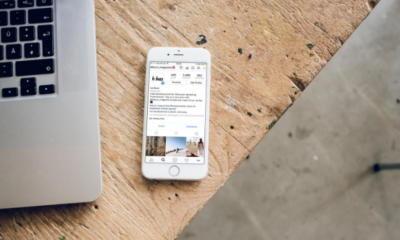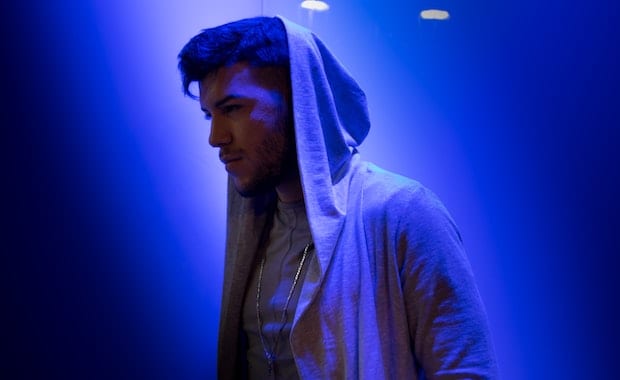Life
Why I Drastically Reduced My Social Media Consumption (And I Work in Social Media!)

Recently, I’ve been experimenting with the way I consume, create and connect using social media.
What started out as a tool that was supposed to bring us together has turned into something we didn’t expect. Now, I’m the biggest advocate of all when it comes to social media. So much so, that I’ve dedicated most of my career to it.
This post is not designed to get you to delete social media and go and live off-grid, away from the Internet, on a farm, with no car and no connection to the community around you.
The point is to get you to rethink your social media usage.
These are the 4 burdens of social media:
Responding to comments
One of my coaching clients said to me the other day “How do you find time to respond to all of the comments you get online?”
I told him “I don’t.”
This is a new thing for me. If I go back six months, I was responding to every comment I got. It’s no secret that by responding to comments on social media in real-time, you get more engagement on your posts.
So yes, commenting is good if you are building an audience and want more people to see your work, but on the downside, you become a slave to comments.
The other challenge with comments is that you will get trolls and people that say nasty stuff. No matter how hard you try, some of them will affect your mindset, motivation or even your mood.
This is why I have drastically reduced the comments I respond to. I still engage and support people that like my work, I just do it less.
This leaves me more time to create, which ultimately provides more value than a reply to a comment.
Liking people’s posts
Social media also brings on the expectation that you’re supposed to like people’s posts who supported you, are your family or maybe even your work colleagues or friends.
I always like to support other people’s work, but I disagree with people expecting me to. Some posts just don’t resonate with me and that’s why I don’t reshare them even if they are my friends, colleagues or even super fans of my work.
Responding to direct messages
“Instant messaging has been the bane of my existence. It’s like a meeting that never ends”
Now everyone can reach me. This might seem like it makes us more connected but I don’t feel it does. Instead, it takes up huge amounts of time to respond to direct messages. Even if you use a tool to manage social media messages, it can get overwhelming.
There’s nothing wrong with an ‘ask’ through social media but if you don’t know someone at all, it gets annoying quickly.
Having to check notifications
When I see 150 new notifications on LinkedIn (or any social network) as much as I hate to admit it, it feels good. I end up checking my notifications in meetings, while out for dinner with my significant other and even in the car (dangerous).
“Most of what these notifications are telling me are unimportant but my dopamine addicted brain can’t resist. The need for validation that I am growing or becoming somebody is too great”
<<<>>>>>
It’s for these four reasons that I recently severely limited by social media usage.
This may seem like the action of a crazy person given that I work in social media. I promise you it’s not. I can still have a career in social media or as a blogger without checking apps 100 times a day.
My time is now focused on something far more important:
Maximizing my time creating content that serves my purpose instead of consuming which is what the social media platforms want me to do (I never did like following rules).
<<<>>>
Here are the benefits I got by drastically reducing my social media usage:
Less stress
The recent test I took to measure my cortisol levels shows that I’m currently at 800 on the cortisol scale and the normal range is between 0-400.
I’ve been looking for any way I can to reduce stress. My experimentation with reducing social media has helped significantly.
“I find myself living in flight mode more often and enjoying right now”
One of the biggest flaws with the 24/7 social media model is the increase in stress if nothing else. The need for instant validation is making our stress levels soar. It’s time to fight back!
It’s made me more creative
I’m now being inspired more by things I witness in real life as opposed to the sometimes made-up, perfect world of social media. Creativity fuels our passions and even our businesses.
It takes empty space and free time to be creative. Social media was sucking up all my spare time after work and on the weekend. By consuming less, I had blocks of spare time to create.
That also gave me time to be inspired by books that fuel my imagination like Harry Potter (strangely enough).
I feel freer
Being tied to my phone and glued to social media is like having chains around my arms.
“It’s been nice to be free of advice, funny videos, opinions, politics and everything else that is like a fire hose in your face”
More present
Meditation has been something I’ve sucked at for a long time. I find it hard to be present and observe the now. Part of the reason, I’ve discovered, is that I was thinking about what was happening on social media.
Having time away from social media has made being present easier for me. I’m thinking less about how many views I got on LinkedIn today and more about the meaning of life and the people I care about.
It’s not perfect though. I still spend time on social media (obviously) and so I have to balance the benefits, with the negatives like being less present.
Fewer distractions
All the way back to high school, my teachers told me “Tim, you’re easily distracted.”
Even on my report cards, it says it. My teachers put it down to my appreciation of the opposite sex (this is what they said!) but I disagree. I put it down to my need for human interaction which is what has made me love selling in the business world.
None the less, I am easily distracted - that’s a fact. Social media has forced me to check my notifications consistently. Since reducing my social media consumption, I’ve put into action a new strategy.
What I do now is turn off all notifications on my phone, computer, iPad and laptop. I only have SMS and phone call notifications turned on.
This setup allows me to time-box when I check my social media and only look at certain times of the day. By batching similar tasks like checking notifications together, I spend less time overall on social media.
Not only do I have my notifications for social media turned off, but I also do most of the commenting and responding to messages on my iMac. The screen of my phone is small and it makes the process longer, more stressful and it’s a burden on my eyes.
It’s increased my real-world interactions with people
By being less social without the need for social media and online communities, my hunger for connection has not disappeared. If anything, it’s increased.
The only way to get my fix is to attend a social catchup, hang out with workmates, have more meetings with clients and say hi to strangers.
This has improved my confidence, got me out of my comfort-zone and even helped me with my public speaking ability.
Final thought
Social media doesn’t have to be a burden but until you learn to control it, it will wreak havoc on your life. Working in social media makes me a big advocate of the upside, but the downside is not so obvious.
I hope, through my own reduction in social media, you’ve got a new perspective – or at least a different view of social media.
If you want to increase your productivity and learn some more valuable life hacks, then join my private mailing list on timdenning.net
Did You Know
How Skilled Migrants Are Building Successful Careers After Moving Countries
Behind every successful skilled migrant career is a mix of resilience, strategy, and navigating systems built for locals.

Moving to a new country for work is exciting, but it can also be unnerving. Skilled migrants leave behind familiar systems, networks, and support to pursue better job opportunities and a better future for their families. (more…)
Life
10 Research-Backed Steps to Create Real Change This New Year
This New Year could finally be the one where you break old patterns and create real, lasting change.

Every New Year, we make plans and set goals, but often repeat old patterns. (more…)
Life
9 Harsh Truths Every Young Man Must Face to Succeed in the Modern World
Before chasing success, every young man needs to face these 9 brutal realities shaping masculinity in the modern world.

Many young men today quietly battle depression, loneliness, and a sense of confusion about who they’re meant to be.
Some blame the lack of deep friendships or romantic relationships. Others feel lost in a digital world that often labels traditional masculinity as “toxic.”
But the truth is this: becoming a man in the modern age takes more than just surviving. It takes resilience, direction, and a willingness to grow even when no one’s watching.
Success doesn’t arrive by accident or luck. It’s built on discipline, sacrifice, and consistency.
Here are 9 harsh truths every young man should know if he wants to thrive, not just survive, in the digital age.
1. Never Use Your Illness as an Excuse
As Dr. Jordan B. Peterson often says, successful people don’t complain; they act.
Your illness, hardship, or struggle shouldn’t define your limits; it should define your motivation. Rest when you must, but always get back up and keep building your dreams. Motivation doesn’t appear magically. It comes after you take action.
Here are five key lessons I’ve learned from Dr. Peterson:
-
Learn to write clearly; clarity of thought makes you dangerous.
-
Read quality literature in your free time.
-
Nurture a strong relationship with your family.
-
Share your ideas publicly; your voice matters.
-
Become a “monster”, powerful, but disciplined enough to control it.
The best leaders and thinkers are grounded. They welcome criticism, adapt quickly, and keep moving forward no matter what.
2. You Can’t Please Everyone And That’s Okay
You don’t need a crowd of people to feel fulfilled. You need a few friends who genuinely accept you for who you are.
If your circle doesn’t bring out your best, it’s okay to walk away. Solitude can be a powerful teacher. It gives you space to understand what you truly want from life. Remember, successful men aren’t people-pleasers; they’re purpose-driven.
3. You Can Control the Process, Not the Outcome
Especially in creative work, writing, business, or content creation, you control effort, not results.
You might publish two articles a day, but you can’t dictate which one will go viral. Focus on mastery, not metrics. Many great writers toiled for years in obscurity before anyone noticed them. Rejection, criticism, and indifference are all part of the path.
The best creators focus on storytelling, not applause.
4. Rejection Is Never Personal
Rejection doesn’t mean you’re unworthy. It simply means your offer, idea, or timing didn’t align.
Every successful person has faced rejection repeatedly. What separates them is persistence and perspective. They see rejection as feedback, not failure. The faster you learn that truth, the faster you’ll grow.
5. Women Value Comfort and Security
Understanding women requires maturity and empathy.
Through books, lectures, and personal growth, I’ve learned that most women desire a man who is grounded, intelligent, confident, emotionally stable, and consistent. Some want humor, others intellect, but nearly all want to feel safe and supported.
Instead of chasing attention, work on self-improvement. Build competence and confidence, and the rest will follow naturally.
6. There’s No Such Thing as Failure, Only Lessons
A powerful lesson from Neuro-Linguistic Programming: failure only exists when you stop trying.
Every mistake brings data. Every setback builds wisdom. The most successful men aren’t fearless. They’ve simply learned to act despite fear.
Be proud of your scars. They’re proof you were brave enough to try.
7. Public Speaking Is an Art Form
Public speaking is one of the most valuable and underrated skills a man can master.
It’s not about perfection; it’s about connection. The best speakers tell stories, inspire confidence, and make people feel seen. They research deeply, speak honestly, and practice relentlessly.
If you can speak well, you can lead, sell, teach, and inspire. Start small, practice at work, in class, or even in front of a mirror, and watch your confidence skyrocket.
8. Teaching Is Leadership in Disguise
Great teachers are not just knowledgeable. They’re brave, compassionate, and disciplined.
Teaching forces you to articulate what you know, and in doing so, you master it at a deeper level. Whether you’re mentoring a peer, leading a team, or sharing insights online, teaching refines your purpose.
Lifelong learners become lifelong leaders.
9. Study Human Nature to Achieve Your Dreams
One of the toughest lessons to accept: most people are self-interested.
That’s not cynicism, it’s human nature. Understanding this helps you navigate relationships, business, and communication more effectively.
Everyone has a darker side, but successful people learn to channel theirs productively into discipline, creativity, and drive.
Psychology isn’t just theory; it’s a toolkit. Learn how people think, act, and decide, and you’ll know how to lead them, influence them, and even understand yourself better.
Final Thoughts
The digital age offers endless opportunities, but only to those who are willing to take responsibility, confront discomfort, and keep improving.
Becoming a man today means embracing the hard truths most avoid.
Because at the end of the day, success isn’t about luck. It’s about who you become when life tests you the most.
Change Your Mindset
The Four Types of Happiness: Which One Are You Living In?
Most people chase success only to find emptiness, this model reveals why true happiness lies somewhere else.

In a world driven by rapid technological growth and constant competition, many people unknowingly trade joy for achievement. (more…)
-

 News3 weeks ago
News3 weeks agoBrandon Willington Builds 7-Figure Business by Ignoring Almost Everything
-

 Health & Fitness4 weeks ago
Health & Fitness4 weeks agoWhat Minimalism Actually Means for Your Wellness Choices
-

 Did You Know4 weeks ago
Did You Know4 weeks agoWhy Most Online Courses Fail and How to Fix Them
-

 Business4 weeks ago
Business4 weeks agoIf Your Business Internet Keeps Letting You Down, Read This
-

 Business2 weeks ago
Business2 weeks agoEntrepreneur’s Guide to Pay Stubs: Why Freelancers and Small Business Owners Need a Smart Generator
-

 Business2 weeks ago
Business2 weeks agoThe Salary Shift Giving UK Employers An Unexpected Edge
-

 Scale Your Business2 weeks ago
Scale Your Business2 weeks ago5 Real Ways to Grow Your User Base Fast
-

 Business2 weeks ago
Business2 weeks agoThe Simple Security Stack Every Online Business Needs

























